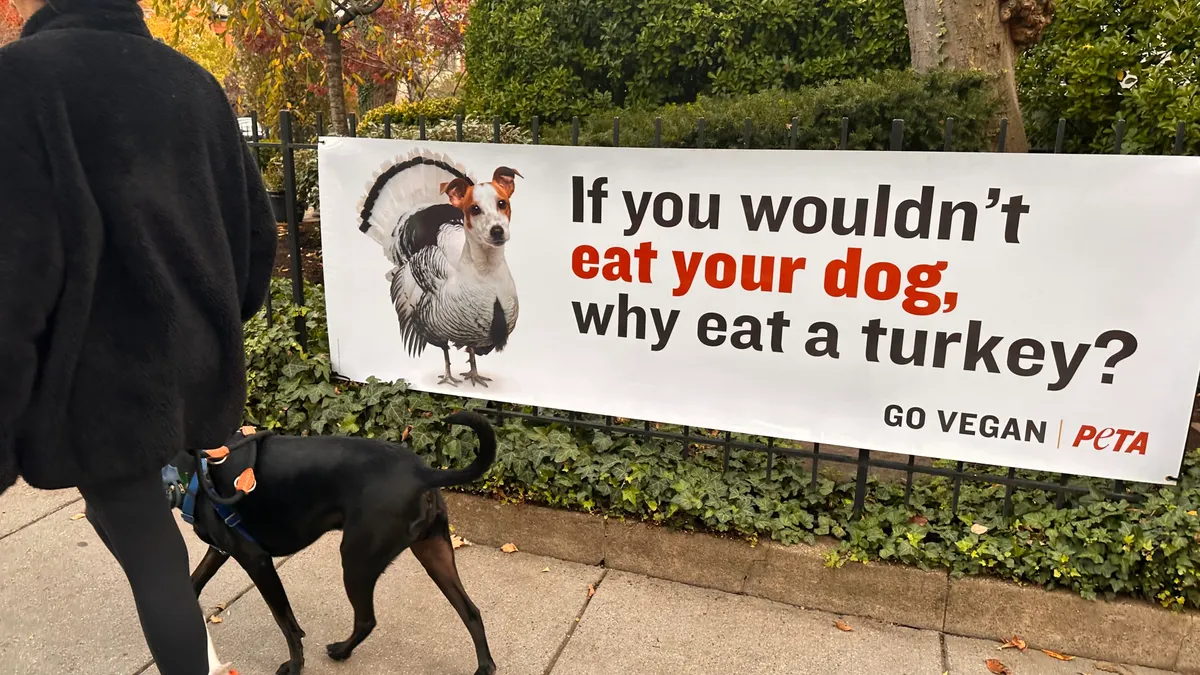People for the Ethical Treatment of Animals, also known as PETA, is synonymous with animal rights in the U.S.
Some of my first knowledge of “animal rights activism” revolves around the organization’s shock-jock tactics: nudging the animal testing in cosmetic conversation along with pictures of bunnies with crusted-up eyes, and sloshing the Olsen sisters in crimson paint to protest their fur-focused sartorial choices. The late Chester Bennington posing shirtless for the “Ink not Mink” campaign was big for adolescent Caroline.
Fast forward to 2023, where I’m on my way to the Industry Dive office. Whereas most national headquarters in Washington, D.C., are nondescript and self-effacing, PETA’s multicolored elephant statue and kitschy slogans tacked to the fence catch eyes. (Its Thanksgiving slogan recently caught heat on viral D.C. news and meme account @washingtonianprobs.)
With my labor reporter hat always on, this called to mind recent research showing that employees increasingly want to work for employers that align with their personal values. But it made me wonder: Does values alignment go in both directions? Do you have to be vegan to work at PETA?
The short answer? It’s complicated.
The longer answer is that veganism is a job requirement when it’s pertinent.
“PETA requires employees to be vegan only if they are in roles advocating vegan food choices, such as our ‘Lettuce Ladies,’ while applicants for certain other positions, like those in IT, are not required to be vegan,” a PETA spokesperson said over email.
“However, in our experience, seeing our video footage and learning about how animals suffer in laboratories and for food, clothing, and entertainment invariably inspires everyone to go vegan,” they added.
The ethos seemingly extends to the organization’s volunteer opportunities. To be on PETA’s action team, for example, the firm says individuals don’t have to be vegan, “but since the best thing anyone can do to help animals is not to eat them, we encourage everyone to go vegan,” the action team’s FAQ reads.
What the spokesperson said, it seems, is that veganism is embedded in the workplace culture. In fielding queries about talent acquisition, the spokesperson added that “nothing taken from an animal, whether shoe leather or cheese crackers, is allowed in our offices or at our events.”
Hiring and firing (or resigning) based on a conflict of values has become increasingly popular over the last five years. Some notable examples include former Paramount TV President Amy Powell being ousted in 2018 after using racially charged language — actions the employer deemed "inconsistent with company values."
A few years later, we observed large-scale employee efforts to reshape company values: Activision Blizzard employees walked out in 2021 to protest a workplace culture they alleged normalized sexual harassment and gender discrimination. And Netflix employees expressed dissent following Dave Chapelle’s Netflix Original comedy special — particularly regarding a transphobic bit that the media company left in. Netflix’s trans ERG organized a walkout after the streaming company doubled down on its support of the comedian.
HR studies continue to show us that people want to work at companies that share their social values; this is particularly true for Gen Z workers, data shows. Even prior to the Great Resignation and the labor market shifting in favor of employees, workers were vocal about seeking employers whose values align with their own.
TL;DR: Culture fit goes both ways.
As for PETA, a spokesperson noted that while job candidates don’t have to be vegan, “successful applicants must at the very least be kind and open-minded if they are not already vegan.”
They added, “We would not hire a sports hunter or someone who held another anti-animal position contrary to our animal protection mission.”
Sorry big-game hunters — I’m not a PETA recruiter, but you’re probably not going to get called back for that Lettuce Lady role.












